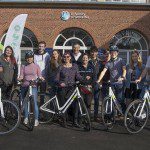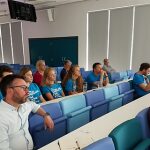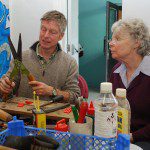Transport related carbon emissions is a major contributor to the carbon footprint with staff and student commuting producing 5,823 tonnes of greenhouse gas emissions accounting for 30% of the overall footprint for the University in 2013/14.
During the last few years, the University of Worcester has been in a period of sustained growth and development. The expansion of the University has the inevitable consequence of additional travel to and from the campus, resulting in increased pressure on the local road infrastructure at peak times and on campus car parks. The estate has grown in size by 54% and has gone from a single campus to three major sites. Student numbers have nearly doubled during the same period.
To mitigate the impacts there are a range of sustainable travel initiatives on campus where students and staff are encouraged to change their travel habits, either for every time they travel to campus, or between the sites, or to make a change on a few days.
The University of worcester bike loan scheme is an illustration of a localised circular economy facilitating active transport for students’, staff and the local community.
The local charity that run the bike shop and administer the bike loan scheme is Spokes, a charity that works with young individuals with learning disabilities to develop mechanics skills and self-confidence, so to help find and remain in employment. Spokes collect unwanted bikes from the local recycling centre, and bikes abandoned on campus and so far collecting nearly 300 bikes. These are reconditioned by Spokes students then resold from their workshop and in the campus shop. This model has provided Spokes students with a rewarding activity while re-using unwanted bikes and bringing them back into use on campus and wider community at an affordable price. The shop is promoted to local residents who are encouraged to come on campus to buy bikes; thus providing a local charity with a source of income.
Short term bike hire: an ideal solution?
In 2010 the university identified a gap in cycling provision, mainly for international students, for short term bike hire. We had affordable bikes for sale in the campus shop run by a local social enterprise. What we wanted was the ability to hire a good quality bike while eliminating the burden of purchasing, storing and maintaining a bike. Students especially didn’t want to purchase or transport a bike from home, but they just wanted easy access to a bicycle when they needed it.
It appeared to be an ideal solution, many major cities where bringing in similar schemes, why not in Worcester? Having an incumbent bike shop on campus, a demand from students, and an organisational target to reduce carbon emissions surely made it easier.
Why then did it take four years to truly get off the ground?
Challenges
- It took nearly 2 years to get the principle of a Bike Loan Scheme agreed. Colleagues needed convincing it would not have a negative impact on the University reputation should a student or staff member have an accident whilst using a loan bike, concerns over thefts/vandalism and impacts on insurance, fears all bikes would end up ‘down the hill’, worries over impacts to reception staff, busy workloads, and finally scepticism that students or staff just didn’t want to use short term loan bikes.
- This challenge was overcome through the perseverance of MotoV8 the initial contract holder of the University ‘on campus’ bike shop and their willingness to pilot this at cost neutral to their social enterprise (training and workshops for young people at risk).
- The initial excel booking system caused a range of issues as reception staff had difficulty recording bike bookings and it became impractical to keep track of hire bike’s status and their location.
- This challenge was overcome through the development of a user friendly online booking system which would allow up-scaling and keeping track of loan bike locations. The success of the system has centred on the on-line functionality. This was an in-house design, developed in conjunction with information and learning staff. It’s now quick, user friendly and intuitive for busy reception staff to use 24/7. Receptions by their nature are staffed by a high number of reception and security staff and many posts are filled with short term student contracts so training and operation needed to be easy.
- The addition of a network point for the bike shop staff to access the online administrations system, together with heating and a re-purposed bin store.
Funding from a Nesta Workplace Cycling Challenge 2013 grant raised the profile of the project and the online system has now facilitated over 1,500 bike hires between September 2013 and September 2014 – with 9,069 miles cycled.
Attitudes and perceptions to cycling to work and university
The bike loan approach to increasing rates of cycling amongst staff and students is based on research by Gatersleban & Appleton (2007), who found that a majority of people from their sample had never considered trying cycling. Many people have a tendency to not consider cycling as an option and choose to travel by car out of habit. Yet, when people are given the opportunity and support to try cycling they find it a positive experience and significantly more likely to form new commuting habits. The scheme is designed to remove as many barriers as possible which prevent people from trying cycling and forming new habits.
Gatersleban & Appleton (2007) Contemplating cycling to work: attitudes and perceptions in difference of change. Transportation Research Part A: Policy and Practice.
















